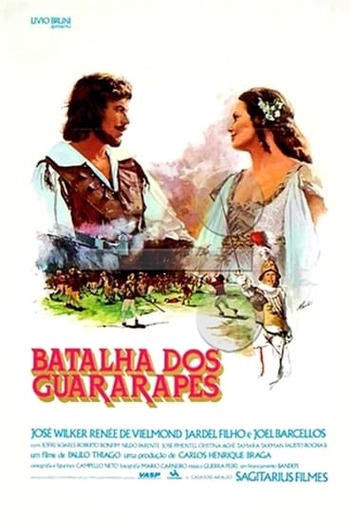
Batalha dos Guararapes (Battle of Guararapes in English) is a 1978 historical movie directed by Paulo Thiago depicting the Dutch invasions of Northeast Brazil. In the beginning of the 17th Century, Brazil is a Portuguese colony which has been occupied by the Dutch East Indian Company for their rich resources and sugar plantations. With Portugal too weak to help their colonists, it's up to them to forge an alliance with the natives and former slaves to drive out the invaders, culminating into the titular clash.
Considered one of the biggest and most expensive super-productions in Brazilian cinema, it featured a cast of 120 actors with more than 3 thousand extras, costing 3,5 million dollars at the time of it's production.
Batalha dos Guararapes depicts examples of the following tropes:
- Anti-Hero: João Fernandez Viera. He switches sides to the Dutch at the very start of the movie because he is disillusioned with the Portuguese exploiting his home, but decides to assist the rebellion later on the movie.
- Artistic License – History: The Netherlands is referred to as being governed by a king which is incorrect in 1645; they were a republic headed by a Stadholter (or Steward) and they wouldn't be a monarchy until much later.
- Alike and Antithetical Adversaries: The Brazilians are an ethnically diverse bunch formed from white colonists, African former slaves and native tribesmen united under the banner of Catholicism and patriotism against their Dutch antagonists, who are all European and Protestants that employ natives as lowly mooks rather than equals.
- Badass Native: The Potiguara tribesmen make up one of the rebel forces and their leader Filipe Camarão (real name Potiguaçu) definitely qualifies.
- Christianity is Catholic: Averted. The religious divide is established between the Catholic Brazilians and the Calvinist Dutch, who are said to pray to "Calvin's Jesus hated by the Jesuits and the Pope".
- Church Militant: The Brazilians are Catholic and their struggle is not only considered patriotic, but also religious as well due to the Dutch being "heretics" as Protestants, and enemies of the Pope and the Jesuits (who played a huge influence Brazilian society). This insurrection is also referred to as "War of the Divine Light".
- Deliberate Values Dissonance: Even though black freemen are featured among the resistance fighters, the movie doesn't shy away from showing that slavery is still part of society and some sympathetic characters such as Ana are slave owners.
- The Empire: The Dutch Republic, ironically enough.
- Epic Movie: Over 2 hours long and featuring thousands of extras, it most certainly qualifies.
- La Résistance: The Brazilian loyalists to the Portuguese crown.
- Historical Domain Character: The rebel leaders André Vidal de Negreiros, João Fernandes Vieira, Henrique Dias e Filipe Camarão, and Dutch governor Maurice of Nassau are all central characters.
- MegaCorp: The Dutch East Indies Company serves as direct antagonists of the movie.
- "Not So Different" Remark: João Fernandez's reasoning for deserting to the enemy: he tells the Dutch governor they are just like the Portuguese and the Spaniards (something which outrages the other Dutchmen since they are mortal enemies) because they are all exploiting Brazil for it's resources like gold and sugar, so he might as well aid the group on top.
- Real Men Love Jesus: Both the Brazilians and the Dutchmen, though they believe their "Jesus" is different from the other.
- Rock Beats Laser: The Potiguara are armed only with spears and shields, yet their entry into the battle against the Dutchmen who are armed with fire weapons turns the tide into the Brazilians' favor.
- Romancing the Widow: Ana Paes is a homestead owner who became massively indebted following her husband's death and becomes João's love interest.
- Sinister Minister: Maurice's Calvinist priest who serves as his adviser plans on converting the Brazilian population to Protestantism while looking positively sinister.
- Translation Convention: All characters speak Portuguese, even the Dutch and the Brazilian natives.
